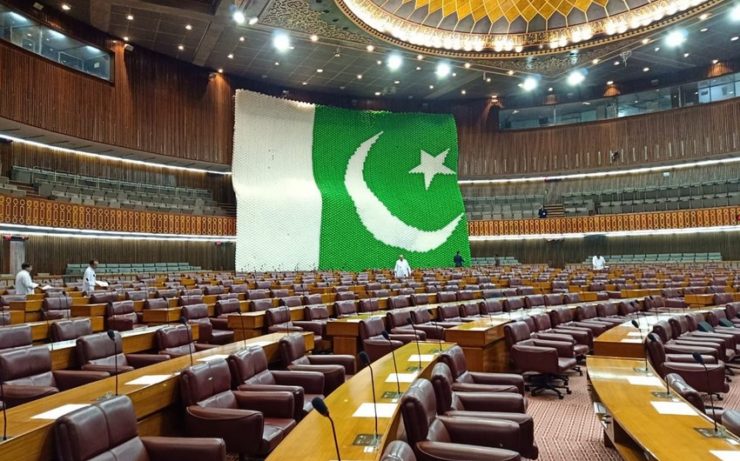
Pakistan is set to conduct general elections on 8th February 2024. Following the internal political instability in the country, and the regional and global geopolitical events, these elections hold seminal significance. The results of these elections will be highly consequential for the future of Pakistan. Although the results of the elections are highly predictable, the upcoming government will have to face formidable challenges ahead.
Due to the political chaos in the country and the alleged role of the establishment in the electoral process, the foremost challenge that the upcoming government will have to face will be its credibility. The common perception in the country is that the PML(N) will gain victory in the upcoming elections. The unfolding events in the country also endorse this perception. Any setup, against the popular will, will struggle to survive in the country. This will lead to a further decline in the democratic values in the country. The domestic political environment will also get more volatile. Consequently, the role of non-democratic forces in the country will also strengthen.
Moreover, rising poverty is another major challenge that will test the abilities of the next government in Pakistan. The poverty rate in the country has climbed to a new zenith. According to the World Bank, almost 95 million people live below the poverty line, making the poverty rate reach 39.4 percent, in Pakistan. Furthermore, the unemployment rate has also reached 8.5 percent in the country, according to the International Labor Organization. This has augmented a huge brain drain from the country. Over, 800000 skilled and educated Pakistani youth moved overseas in quest for jobs. According to a senior economist in Islamabad, a whopping ratio of 67 percent of youngsters seek to move abroad for a better future. Poverty is the most seminal underlying cause of all these issues. The upcoming government in the country will have to tackle this issue on an immediate basis.
Pakistan is passing through the worst economic turmoil in its history. In December 2023, the inflation rate in the country reached 29.70 percent. Almost 1600 clothing factories in Pakistan have ceased their operations, leaving almost, 700000 workers unemployed. The closure of these factories has also impinged the export sector of the country, as it contributes 60 percent to its exports. Climate-induced flooding also led to a loss of almost $30 billion to Pakistan, as per the World Bank. Moreover, in October 2023, the current account deficit of the country reached a colossal amount of $74 million according to the State Bank of Pakistan. The new government in the country will struggle to cope with the economic needs of the country. Just like the previous governments, it will have to borrow loans from the IMF and friendly countries to run its operations. However, the government will face significant pressure from the opposition parties and the people of the country to devise effective policies to deal with this economic crisis once and for all.
Terrorism has once again surged in Pakistan in the past few years. The volatile domestic political environment and the rise of the Taliban government in neighboring Afghanistan are the two core reasons behind rising terrorism in the country. More than 664 terrorist attacks, including 29 suicide attacks, were conducted in Pakistan in 2023, killing almost 1000 people collectively. The country faced the highest number of suicide attacks since 2014 in the previous year. This new wave of terrorism followed several negative ramifications. Terrorism leads to a decrease in foreign direct investment in a country. Many of the terrorist attacks were conducted on the Chinese engineers working on the China-Pakistan Economic Corridor (CPEC). This has also led to slowing down the progress of the project. Pakistani officials have blamed TTP, BLA, and RAW for these attacks. Furthermore, officials in Pakistan blame the Taliban government in Afghanistan for providing a safe haven to different terrorist organizations, especially TTP and BLA. Relations between Pak-Afghan governments have turned bitter over the terrorism issue.
Terrorism will be one of the major issues that the new government will have to deal with. Mending Pakistan’s fences with the Taliban government in Afghanistan is an issue that holds significant importance. The new government will need to establish cordial relations with the Taliban government while keeping Pakistan’s interests secured. Moreover, the government will have to take decisive action against the terrorist organizations operating from remote areas of the country.
On the international front, the government will face difficulty in balancing relations between the United States and China, given its economic needs and geostrategic location. For the past few years, Pakistan has been seeking to remain neutral in the great power rivalry. However, the country is highly dependent on Western institutions like the IMF and the World Bank due to its economic needs. Therefore, it seeks closer ties with the United States. However, the growing US-India partnership has instilled a feeling of insecurity among the policymakers in Pakistan. This coerces them to maintain healthy relations with China and Russia, in order to meet the country’s security needs. The upcoming government will keep struggling to balance its relations with the United States and China. It will also have to revamp Pakistan’s image in the Middle East, especially the Gulf, given the rising influence of India in the GCC. However, the government will struggle to survive at home as the political turmoil in Pakistan does not seem to end soon.
Abbas Hashemite – is a political observer and research analyst for regional and global geopolitical issues. He is currently working as an independent researcher and journalist, exclusively for “New Eastern Outlook”.
